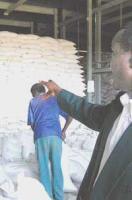







|
News and Information
Desperate San eat rotten food
| March 14, 2006 |

* LINDSAY DENTLINGER
SHEER hunger and desperation forced San communities in West Caprivi to eat mouldy rice, despite being told that it was to be fed to their animals only.
An investigation by the Emergency Management Unit following a report in The Namibian last month confirmed that congealed rice swept up from the floor of a warehouse at Katima Mulilo had been delivered to San communities at Chetto, Omega 3, Kachenje and Mushambo as food aid.
A report handed to Cabinet Secretary Frans Kapofi last week said most traditional leaders from these villages had been told by officials from the Caprivi Regional Management Unit (Remu) that the rice was not fit for human consumption and that they should feed it to their chickens and pigs.
'FORCED TO EAT RICE' Nevertheless, villagers told an EMU mission that they were forced to eat the rice anyway, because they were hungry and had nothing else to eat.
Those who ate the rice, said they had washed it first before cooking it.
"Hunger was the main cause that forced them to consume spoilt rice," the report says.
Laboratory testing of samples of the congealed rice brought to The Namibian revealed that the rice had become damp and was contaminated with fungi and bacteria.
The State Veterinary Laboratory said the rice sample was unfit for both human and animal consumption.
According to Deputy Director of the Emergency Management Unit Gabriel Kangowa, no reports of illness as a result of eating the spoilt rice have been received.
"Government should in future not attempt to distribute any spoilt or unfit items to people who are not in possession of anything [else] to eat, as they will be forced to eat these items," Kangowa said.
He said he found that these communities were so desperate for food that they had even eaten seeds they had received from the Caprivi Regional Council to plant.
At Omega 3, Kangowa said he was told that children in the surrounding areas were so hungry that they were not attending school.
Kangowa found that the school-feeding programme in West Caprivi had not been running since December.
At Chetto, Kangowa said he had met with headman Abraham Bock who said his community had received 20 bags of rice along with 40 boxes of biscuits.
Distribution officials said Bock was expressly told that his community should only feed the rice to their animals.
They ate it all anyway.
At Omega 3 a further 15 bags of rice were delivered with 70 boxes of biscuits.
There a member of the Constituency Development Committee said they had misunderstood instructions from Remu officials that they must not eat the rice.
Most of the officials cannot speak the local San languages, and the San leaders do not all understand English.
At Kachenje, the induna (traditional leader) of the area said her community had received six boxes of biscuits and six bags of rice.
The mission found she still had half a bag of rice, after people were stopped from eating it.
She said they had eaten it because they were hungry, but stopped after realising it was not fit to be eaten.
At Mushambo, 250 people along with headman Ngolongota Tanawo gathered for a meeting with Kangowa and his investigating team two weeks ago.
They confirmed that they were told not to eat the 19 bags of rice they had received.
But all the rice was distributed among them anyway and none could be found when the mission visited the area.
Besides the rice, the Mushambo community also received 53 boxes of biscuits and two boxes of clothes from Remu officials.
These San communities have since received a delivery of maize meal to meet their immediate food needs.
SEARCH & DESTROY The isolated areas of West Caprivi are home to more than 1 600 San people.
Kangowa said Remu officials had been instructed to confiscate and destroy any of the spoilt rice found in the area.
He further told The Namibian that in future, the San communities would no longer receive food aid from stocks in Katima Mulilo warehouses.
Instead, maize meal will be sent directly to these San communities either from Rundu or Windhoek, wherever the food is being sourced.
A Remu official will be required to meet the truck in the area to do the necessary paperwork accompanying delivery.
A consignment of 3 500 bags of maize meal is scheduled to be delivered to the area this week.
Kangowa said headmen had identified places where the food can be stored instead of taking it to Katima Mulilo.
"Food will flow in constantly now to avoid starvation," said Kangowa.
Most of these San communities are cut off from basic services and telecommunications and have virtually no source of income.
They do not participate in any food-for-work programmes either.
Kangowa said it would be up to the Caprivi Regional Council to initiate programmes for the communities to improve their food security.
|
Source: www.namibian.com.na |
| http://www.namibian.com.na/ |
|
| Support Caprivi Freedom |
Fill out the form below to become a member of this site and receive our regular newsletter.
|

|

